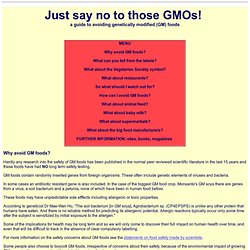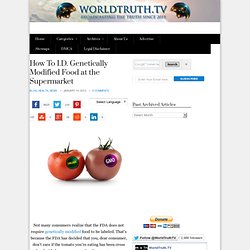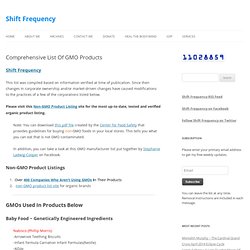

Non-GMO Shopping Guide. How To Avoid GM Foods. Just say no to those GMOs!

A guide to avoiding genetically modified (GM) foods Why avoid GM foods? Hardly any research into the safety of GM foods has been published in the normal peer reviewed scientific literature in the last 15 years and these foods have had NO long term safety testing. GM foods contain randomly inserted genes from foreign organisms. These often include genetic elements of viruses and bacteria. In some cases an antibiotic resistant gene is also included. These foods may have unpredictable side efffects including allergenic or toxic properties. According to geneticist Dr Mae-Wan Ho, “The soil bacterium [in GM soya], Agrobacterium sp.
Some of the implications for health may be long term and so we will only come to discover their full impact on human health over time, and even that will be difficult to track in the absence of clear compulsory labelling. For more information on the safety concerns about GM foods see the statements on food safety made by scientists. Gerald B. GMO Food Finder/Tracker. This page is dedicated to tracking the spread of Genetically Modified Organisms around the world.
Monsanto to Acquire Central America’s Largest Seed Company Expects Deal to Expand Hybrid Corn business June 19, 2008 Fort Mills Times, SC ST. Monsanto says the acquisition solidifies the St. SCB is based in Guatemala City and focuses on hybrid corn seed production, particularly corn, sorghum, forage sorghum, soybeans, and pastures or grass-type seeds. The following GMO database (Biotrack Product Database) is taken from the OECD Website. Here is the disclaimer from the site: The objective of this database is to allow regulatory officials in the OECD member countries to easily share basic information on products derived from the use of modern biotechnology, as well as some products with novel traits acquired by the use of conventional breeding or mutagenesis, that have been approved for commercial application in terms of food, feed or environmental safety.
Notes: Download PDF here: biotech-organisms. How To I.D. Genetically Modified Food at the Supermarket. Not many consumers realize that the FDA does not require genetically modified food to be labeled.

That’s because the FDA has decided that you, dear consumer, don’t care if the tomato you’re eating has been cross bred with frog genes to render the tomato more resistant to cold weather. Some consumers may not be concerned with eating Frankenfood, but for those who are, here’s how to determine if the fruits and vegetables you’re buying are (GM) genetically modified.
Hat tip to Marion Owen for her valuable information. Here’s how it works: For conventionally grown fruit, (grown with chemicals inputs), the PLU code on the sticker consists of four numbers. For example: A conventionally grown banana would be: 4011 An organic banana would be: 94011. Comprehensive List Of GMO Products & Companies. Comprehensive List Of GMO Products. Shift Frequency This list was compiled based on information verified at time of publication.

Since then changes in corporate ownership and/or market-driven changes have caused modifications to the practices of a few of the corporations listed below. Please visit this Non-GMO Product Listing site for the most up-to-date, tested and verified organic product listing. Note: You can download this pdf file created by the Center for Food Safety that provides guidelines for buying non-GMO foods in your local stores. This tells you what you can eat that is not GMO contaminated. In addition, you can take a look at this GMO manufacturer list put together by Stephanie Ladwig-Cooper on Facebook. Hawaii's Big Island Bans All GMO Crops & Biotech Companies. GMO photo from Shutterstock Hawaii is a growing center for genetically modified crops, as large biotech companies like Syngenta, Monsanto, Pioneer, Dow and BASF have set up offices on the smaller islands of Oahu, Kauai and Molokai.

However the island nation is on a mission to stop engineered organisms and make sure they never come to the Big Islands. The Hawaii County Council just passed a bill that bans all genetically modified organisms (GMO) and forbids biotech companies from operating on the Big Island. Hawaii photo from Shutterstock Biotech companies and biologically engineered crops are a large and controversial business in Hawaii. While there’s still not enough scientific data to say whether GMOs are safe or not, they can definitely be harmful to farmers. For now it seems that the GMO debate will continue in Hawaii.
Via Huffington Post.